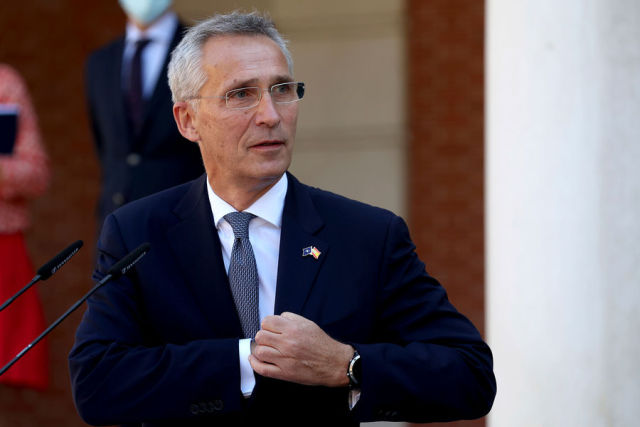NATO Secretary General Stoltenberg announced the deployment of new alliance forces on the border with Russia NATO Chief Jens Stoltenberg called on allies to continue to provide Kiev with comprehensive support.
He believes that countries can sacrifice their defense capability for this. Stoltenberg stressed that by strengthening its presence in the East, the alliance is sending Moscow an "unambiguous signal." Russia believes that the completion of the special operation in Ukraine will lead to a split in the military-political bloc. Details are in the material of "Gazeta.Ru".
If Ukraine stops fighting, "it will cease to exist as an independent state," NATO Secretary General Jens Stoltenberg said at a joint press conference in Brussels with US Secretary of State Anthony Blinken.
The head of the alliance is confident that "if Russia stops fighting, then peace will come."
During his speech, the official urged Western countries to prepare for a long confrontation with Russia. He said that partners should help Kiev with weapons even to the detriment of their own defense capability.
"In the coming months, our unity and solidarity will be tested. Under the pressure of energy supplies and rising prices. But the price that we pay is calculated in money, and the price that Ukrainians pay is calculated in lives," the NATO Secretary General stressed.
He added that the military-political bloc is "significantly strengthening its presence in the eastern part of the alliance." Thus, the West sends Moscow "an unambiguous signal that NATO will defend every inch of the territory of the allies."
Earlier, the head of European diplomacy, Josep Borrel, called the goal of supporting Ukraine: "To help Ukraine end the war, because we want this war to end as soon as possible. But not in any way. We want this war to end with respect for Ukraine's sovereignty."
Moscow's opinion
And although Pentagon Chief Lloyd Austin assured that "NATO does not seek conflict with Russia," Moscow does not believe this and believes that "indirect confrontation increases the risk of a direct collision between Russia and the alliance." This was stated earlier by the Russian permanent representative to the UN Vasily Nebenzia.
At a meeting of the UN Security Council, which took place on September 8, he once again stressed that the supply of weapons to Kiev from the West will not radically change the situation on the battlefield.
"The new weapon will not be able to change the balance of power, but it will be able to prolong the agony of the Zelensky regime and delay the inglorious end of this regime," Nebenzia said.
"Stoltenberg categorically does not care about the future and present of Ukraine. The EU's claims to NATO are already huge, and if NATO does not cope with Russia now, then the beginning of a split is simply inevitable," deputy Adalbi Shkhagoshev told RIA Novosti.
The head of the Crimea, Sergey Aksenov, suggested earlier that after the special operation, Ukraine would cease to exist within its former borders.
"Ukraine will no longer exist within the borders of 1991, you can call it whatever you like, probably the complete elimination of Ukrainian statehood," he said on the air of the Millet channel.
Aksenov believes that "after the surrender of the Ukrainian authorities," NATO countries "will take what remains into circulation." "Of course, they will not abandon their aggressive policy," the official added.
"I am sure that in the remaining territories they will try to create a hostile enclave for Russia, try to strengthen the borders of these territories as much as possible and try to continue to create problems, destabilize the situation, influence the course of adaptation of the liberated territories," he believes.
The head of the Crimean Peninsula noted that this would mean the passage of "only the first stage of the demilitarization of Ukraine." Then there will be "political processes in which it will be necessary to keep abreast and work to ensure that a new enemy in a more serious guise does not grow up next to us."
Milana Helikova

